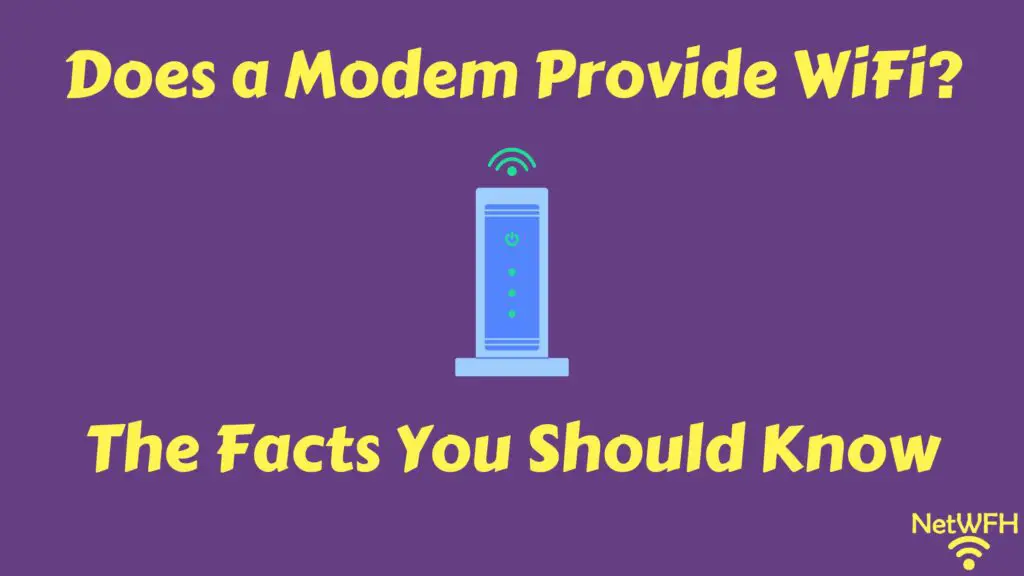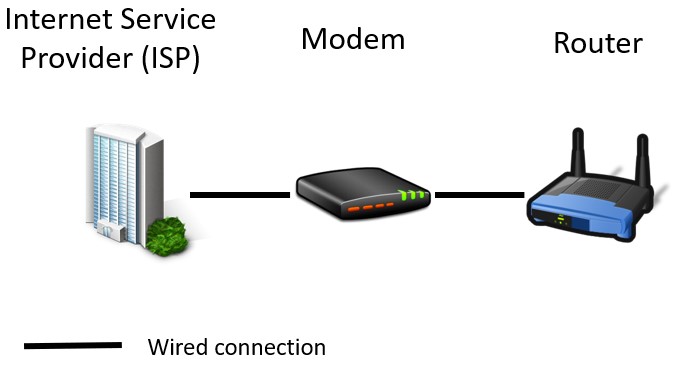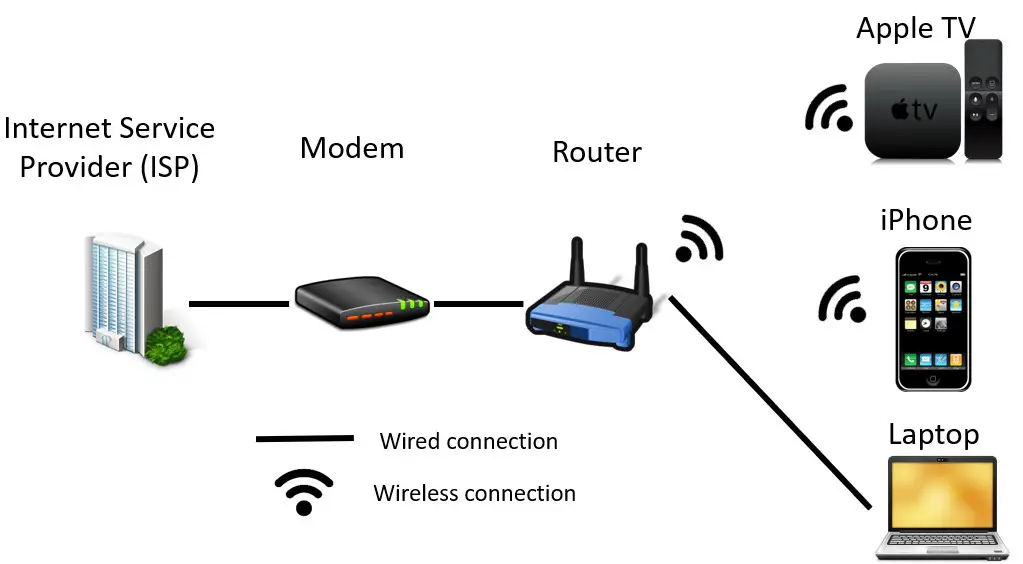This post contains affiliate links.

WiFi is what allows your devices to wirelessly communicate with each other (and the internet).
This is why almost all networks offer WiFi functionality.
The question is: where does WiFi come from?
Does your modem provide your home network with WiFi, or does it come from somewhere else?
Modems do not provide WiFi. Routers are responsible for providing WiFi functionality to networks. With that said, modems and routers must work together if the network is to provide internet connections over WiFi.
In this post, I’ll detail where WiFi comes from in your home network. I’ll also talk about the affect that your modem has on the wireless connections in your home.
Does WiFi Come From My Modem?
The WiFi in your home network doesn’t come from your modem. It actually comes from your router.
Believe it or not, there’s a good reason for this.
It’s because the devices in your home network are specialized. Your modem and router are tasked with very specific jobs that help the network run effectively.
Let’s take a closer look at the specific roles of your modem and router.
Your Modem’s Job in Your Home Network
When it comes to your modem, its job is to maintain an internet connection with your internet service provider (ISP).
This is what provides an internet connection to your home.
Once you purchase an active internet connection from your ISP, it’s your modem that makes that internet plan usable.
This is your modem’s specialization. It’s sole job is to keep this internet connection firing on all cylinders.
What’s important to note is how your modem is connected to your ISP. Your modem is directly connected to your ISP through a series of cables that run from your home to the ISP’s datacenters.
The key here is that the connection between your modem and ISP is a completely wired one. There’s no wireless communication involved.
In other words, no WiFi is needed for the modem to perform its designated task.

This is why your modem isn’t the device that provides WiFi to your home. Any wireless communication hardware on a modem would be overkill, because your modem doesn’t need it to perform its core function.
This explains why your modem doesn’t have wireless components on it like network interface cards (NICs) or antennas.
When it comes to wireless components, your router has everything it needs to provide WiFi to a home network.
Your Router’s Job in Your Home Network
While modems specialize in maintaining an active internet connection with an ISP, routers have a different specialization.
Routers make the internet available to all the devices in the network.
Another way to say this is that routers take the internet connection established by modems and multiply that connection so all the devices on the network can connect to the internet.
Let’s dive into how this works.
Your modem establishes a connection with your ISP to activate your internet plan and make it usable by your devices.
Unfortunately, your modem isn’t able to distribute this internet connection to all the devices in your network. As a result, it needs another device that specializes in this task to help out.
This is where your router comes into play.
Your modem and router communicate with each other over an ethernet cable. As I mentioned above, this communication has to happen with a direct connection because your modem is unable to wirelessly communicate with other devices.
Essentially, your router takes the internet connection that your modem has established and does what it does best: makes sure all your devices can connect to it.
It doesn’t matter if your devices are wired devices or wireless, your router has you covered.

This is why your router is responsible for providing WiFi in your home network. It needs to be able to wirelessly communicate with your internet devices.
In order for this to happen, your router broadcasts a WiFi network that these wireless devices can use to communicate.
Although a modem plays a vital role in your home network, you can thank your router for bringing WiFi to the party.
Do You Need a Modem in Your Home Network in Order to Have WiFi?
Ok, so your modem doesn’t provide WiFi to your home network.
But do you need a modem in the network in order to have WiFi?
In other words, does your router need to be connected to your modem in order to provide WiFi to a home network, or can a router provide WiFi on its own?
The answer here is that a router can provide WiFi without the assistance of a modem.
With that said, there’s more to the answer than you might think.
We’ll start with the basics first.
When it comes to providing WiFi, your router doesn’t need any help. If you only had a router in your home network (and no modem), you’d still have a WiFi network that your devices could use to communicate with each other.
The only problem with this is that your network would be extremely limited in terms of what it could do.
If you’re interested in understanding what you could do if you had a router in your home network and no modem, I’ve written an article on this topic that breaks this down for you.
And now for the catch.
Although a network with a router and no modem would have WiFi, the devices on the network wouldn’t be able to access the internet.
If you remember, earlier I detailed how a modem is responsible for providing an internet connection to your home.
The same principle applies here.
If a modem isn’t present and active in the network, there’ll be no connecting to the internet. Devices will be able to communicate with each other over the WiFi network provided by your router, but that’s it.
The distinction to be made here is that WiFi is just a method of wireless communication. WiFi does not refer to wireless internet connectivity. Internet connections can be provided over WiFi, but WiFi and wireless internet are two different things.
What this means is that a router providing WiFi can only provide wireless internet connections if a modem is also present on the network.
So although you don’t need a modem to have Wifi in a network, you need a modem (and router) if you want to provide wireless internet connections to your devices.
Wrap Up
In the end, it’s important to understand that WiFi comes from your router.
Wireless internet connections, however, are made possible by your modem and router working together. Your router and modem both have specific jobs in a home network, and they both need to be present to get the maximum benefit from your network.
If you have any questions about this information, please leave a comment below.
If this material was useful for you, here are some more articles that you might find helpful as well:
Can I Use a Router Without a Modem?
Can I Just Buy a Modem and Have Internet? What Else You Need
Do You Need an Internet Connection if You Have WiFi?

